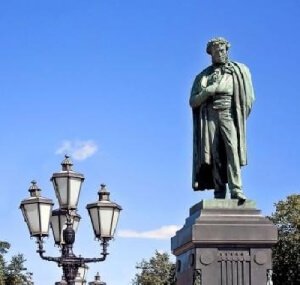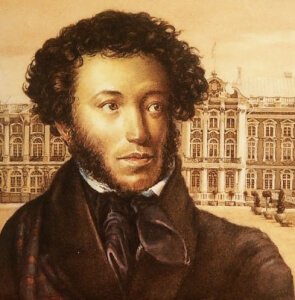Alexander Pushkin was an Afro-Russian poet, playwright, novelist, and social justice advocate. He was born in Moscow on May 26, 1799. He is one of Russia’s most famous poets.
His Russian father and mother of Afrikan ancestry raised their mixed-race son in a life of nobility. Pushkin was proud of his Afrikan heritage, but his eventual exile from St. Petersburg was more political than race-based.
Pushkin’s maternal great-grandfather is the legendary 18th-century General Ibrahim Petrovich Gannibal (Abraham). Gannibal was an Afrikan prince from Cameroon, Africa. Throughout Europe, he gained recognition as a prominent black intellectual.
Gannibal was a skilled engineer and military General to ‘Tsar Peter the Great.’ Pushkin, proud of this family connection to General Gannibal, honors his great-grandfather’s memory in the novel “The Negro of Peter the Great.”
Pushkin’s Adult Life
In 1817, Alexander finished his studies near Saint Petersburg, Russia Selo Lyceum, a school of Liberal Arts. His studies trained him for growth as a future state leader. But Pushkin had other plans for his future.
At his graduation ceremony, Alexander Pushkin recited one of his political poems ‘Ode to Liberty.’ In the verses, he calls upon the people to rise and take a stand against oppressive laws.
He throws shade at the monarch by telling them that eternal law remains higher than they. ‘Ode to Liberty’ called for permanent destruction and death of the throne. The Soviet Crown did not find “Ode to Liberty” entertaining.

Separately from poetry, A.P. had more ideas kindling inside him. Interested in ‘pure atheism’ and membership in secret societies, the ‘social reformer’ gained the monarch’s attention.
Alexander Pushkin was a member of the Decembrists–a Russian revolutionary movement of high-born Russians. The group advocated for all Russian laws to be written in Russian and not in French. At its core, the Decembrists worked to defend low-born families against Tsarists’ rule.
In May 1820, Pushkin’s involvement with the organization led to his exile from Saint Petersburg, Russia. The ruling monarch sent him to Yekaterinoslav (modern-day Dnipropetrovsk, Ukraine).
While exiled, Pushkin lived and traveled within the borders of Northern Caucasus and Crimea. After six years of living outside of St. Petersburg, his petition to return home was granted. The monarch closely monitored his actions and whereabouts. Publication of much of his work stopped.
Duel to the Death
In February 1831, he married Nathalie Goncharova. They produced three children. Nathalie was young, attractive, and flirtatious. Nathalie was cheating on Pushkin with her brother-in-law. It was her foolish behavior that led to Pushkin’s death.
Pushkin, determined to defend his ego, challenged his wife’s brother-in-law to a shooting duel. Pushkin, who had previously fought in twenty-nine duels, was not so lucky in this fight. The brother-in-law fired the first shot.
Pushkin sustained a fatal wound to his lower body that caused life-threatening abdominal injuries. A few days later, on January 29, 1837, Alexander Sergeyevich Pushkin died at thirty-seven.🌹
Sources:
http://www.afropedea.org/afro-russian-black-russian
https://www.findoutaboutrussia.co.uk/who-was-alexander-pushkin.html
https://www.bl.uk/onlinegallery/features/blackeuro/pushkinnegro.html
http://www.saint-petersburg.com/famous-people/alexander-pushkin/

